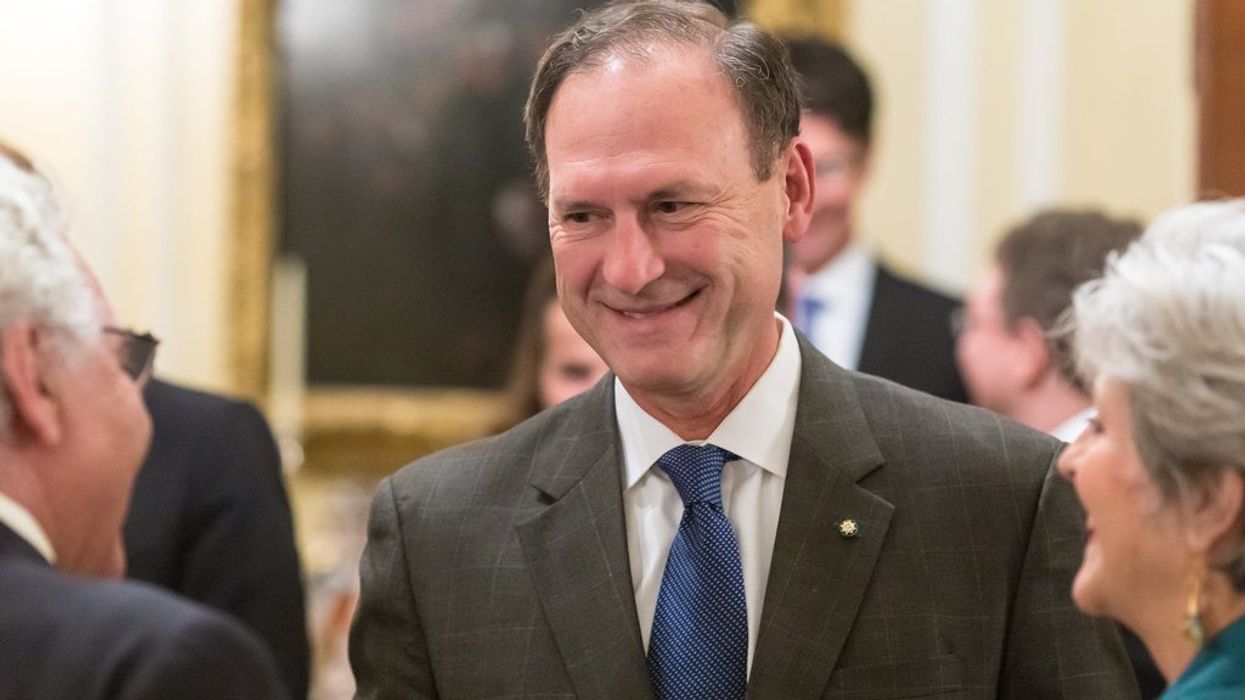'Bush v Gore redux': Expert warns a 'photo finish' election could mean SCOTUS installs Trump

US Supreme Court Justice Samuel Alito, Image via Flickr.
September 17, 2024 | 04:09PM ETElection 2024
The 2024 election may not come down to hundreds of millions of ballots or 538 Electoral College votes, but just handful of Supreme Court justices.
In a new op-ed for the Guardian, author David Daley — who is also a senior fellow at pro-democracy organization FairVote — explained how the Supreme Court of the United States (SCOTUS) could be the deciding factor in the November election if the deciding number of electoral votes comes down to a razor-thin margin. Daley said a "Bush v. Gore redux" was likely if post-election litigation resulted in SCOTUS deciding which candidate wins a contested battleground state.
"There are dozens of scenarios where Trump’s endgame not only pushes a contested election into the courts, but ensures that it ends up before one court in particular: a US supreme court packed with a conservative supermajority that includes three lawyers who cut their teeth working on Bush v Gore, one whose wife colluded with Stop the Steal activists to overturn the 2020 results, and another whose spouse flew the insurrectionist flag outside their home," Daley wrote.
READ MORE: Flag outside Alito's vacation home 'literally carried by insurrectionists': J6 investigator
As Daley noted, Justices Amy Coney Barrett and Brett Kavanaugh — who were appointed by former President Donald Trump in 2020 and 2018, respectively — were both conservative attorneys on the Republican side of the Bush v. Gore case. That controversial decision involved SCOTUS halting Florida's recount in the 2000 presidential election and declaring then-candidate George W. Bush the winner of the Sunshine State by just a few hundred ballots and giving him a slim Electoral College majority.
Daley added that Barrett and Kavanaugh's history — when combined with Justice Clarence Thomas' wife, Ginni actively supporting the January 6 insurrection and Justice Samuel Alito's wife flying a pro-insurrection flag outside of their vacation home in New Jersey — means the High Court's openly partisan conservative majority is already making it clear how it would rule if it were given the ability to decide the election.
"What’s terrifying is that the court has already proved the Republican party’s willing ally," Daley wrote. "The Roberts court laid much of the groundwork for this chaos in a series of voting rights decisions that reliably advantaged Republicans, empowered MAGA caucuses even in swing states, then unleashed and encouraged those lawmakers to pass previously unlawful restrictions based on evidence-free claims of voter fraud."
Aside from the partisan history of the those four aforementioned justices, Chief Justice John Roberts notably authored the majority opinion in the 2013 Shelby County v. Holder case, which gutted section 4 of the Voting Rights Act. That section pertained to states having to obtain "preclearance" from the courts before making major changes to their own election systems. After that decision came down, numerous states — including the battleground states like Georgia and North Carolina — passed laws disenfranchising large numbers of voters under the guise of stopping "voter fraud," which has never played a significant role in deciding any election.
READ MORE: 'Wildly inappropriate': How Ginni Thomas is making SCOTUS' tarnished rep even worse
According to Daley, there are numerous ways in which post-election litigation over vote totals in swing states like Arizona, Georgia, Michigan, Nevada, North Carolina, Pennsylvania and/or Wisconsin could end up before the Supreme Court during the lame duck period between November and January. He added that it could even lead to battleground states with Republican-dominated state governments making moves to delegitimize Vice President Kamala Harris' victory if she indeed comes out on top after ballots are counted.
"Right now in Georgia, a renegade state election board – with Trump’s public gratitude – has enacted broad new rules that would make it easier for local officials to delay certifying results based on their own opinion that 'fraud' occurred," he explained. "Democrats have filed suit to block these changes; even the Republican governor, Brian Kemp, has sought to rein them in. But if those efforts fail, it could create a cascade of litigation and missed deadlines in perhaps the closest state of all."
"That, in turn, could jeopardize the certification of Georgia’s slate of electors – and even encourage the Republican state legislature, a hotbed of election denialism in 2020, to select their own," Daley added.
READ MORE: Why Alito's response to inverted flag controversy is as troubling as symbol itself: analysis
Click here to read Daley's op-ed in full.